Top 10 Fastest Programming Languages in Singapore [2025 Guide]
Choosing the right programming language can make or break your software project — especially when speed, scalability, and developer efficiency are key. In 2025, businesses in Singapore are prioritizing fast programming languages to stay competitive, whether in fintech, e-commerce, or AI.
This guide highlights the top 10 fastest programming languages, the fastest growing ones in Singapore, and how to select the best language based on your business needs. We also cover optimization tips and how vendors like Kaopiz help businesses build fast, reliable systems from day one. Let’s get started.
Table of Contents
- What Are the Fastest Programming Languages?
- 10 Fastest Programming Languages Growing in Singapore (2025)
- Which Languages Are Best for Startups vs Enterprise?
- How to Choose the Right Programming Language for Your Business
- Speed Optimization Best Practices for Software Projects in Singapore
- How Kaopiz Helps Businesses Build Fast, Scalable, and Reliable Systems
- Conclusion
- FAQs
What Are the Fastest Programming Languages?
When we talk about the “fastest” programming languages, it’s important to define what kind of speed we mean.
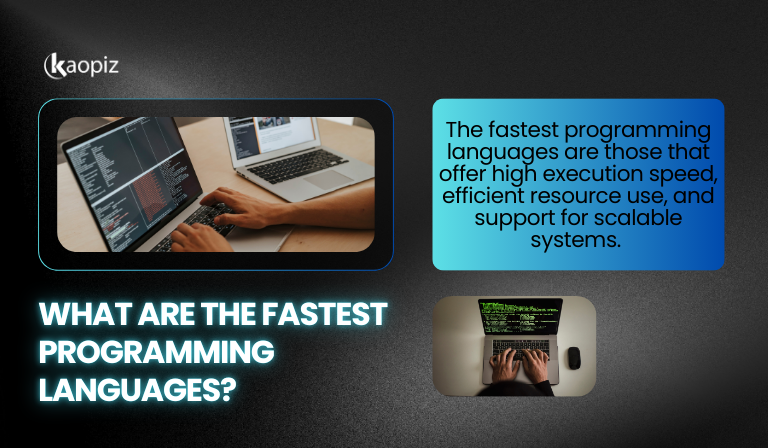
There are three core dimensions to consider when choosing the fastest programming languages:
- Execution Speed: How quickly the language compiles and runs on a machine. This matters most for system-level software, gaming, and real-time applications.
- Development Speed: How fast developers can build and maintain applications using that language. Simpler syntax, libraries, and tooling all influence this.
- Scalability & Performance Under Load: How well the language handles high traffic or complex operations in real-world systems like backend APIs or cloud platforms.
Some languages, like C++ and Rust, lead in raw performance, while others, like Go or Node.js, offer fast compilation and lightweight concurrency for backend development. Meanwhile, Python may not be the fastest by execution time, but its ease of use and massive ecosystem allow teams to ship quickly and iterate faster.
10 Fastest Programming Languages Growing in Singapore (2025)
As Singapore’s tech ecosystem evolves, some web application languages are quickly gaining popularity due to their speed, simplicity, and modern features. Let’s take a look at the 10 fastest programming languages in Singapore that developers and businesses are adopting in 2025.
| Programming Language | Overview | Execution Speed | Use Cases | Scalability |
|---|---|---|---|---|
| C++ | Powerful compiled language offering maximum control and performance | ★★★★★ | Game engines, real-time systems, trading platforms | Medium – high learning curve, hard to maintain |
| Rust | Modern systems language focused on safety and concurrency | ★★★★★ | Blockchain, embedded systems, secure backend APIs | High – memory-safe, ideal for critical systems |
| C | Low-level procedural language, still used in core infrastructure | ★★★★★ | OS development, embedded firmware, drivers | Low – lacks modern tooling, hard to scale |
| Go (Golang) | Simple syntax, fast compile time, built-in concurrency | ★★★★☆ | Cloud-native backend, APIs, DevOps tools | High – designed for modern distributed systems |
| Java | Object-oriented language with large enterprise adoption | ★★★★☆ | Banking, retail systems, enterprise backend services | High – robust JVM support, great ecosystem |
| Julia | High-level language optimized for numerical computation | ★★★★☆ | Data science, machine learning, scientific modeling | Medium – fast for specific use cases |
| Kotlin | Modern alternative to Java with concise syntax and JVM compatibility | ★★★★☆ | Android apps, Spring Boot backends | High – fast-growing and versatile |
| Swift | Apple’s native language for fast, modern iOS/macOS development | ★★★★☆ | iOS apps, macOS applications | Medium – strong within Apple ecosystem |
| Python (Cython/PyPy) | Easy to learn, with performance boosters like Cython and PyPy | ★★★☆☆ | AI/ML, automation, education platforms | Medium – slower runtime, mitigated with tools |
| JavaScript (Node.js) | Event-driven, fast I/O for scalable web backends | ★★★☆☆ | Web servers, chat apps, real-time services | High – widely adopted for full-stack apps |
C++
C++ is one of the fast programming languages gaining popularity in Singapore. It is a high-performance, compiled language known for its speed and control. This language compiles directly to machine code, allowing developers to fine-tune performance at the system level. This makes it ideal for building game engines, trading platforms, and real-time applications.
In Singapore, C++ remains popular in sectors like finance and embedded systems, where every millisecond counts.
Why it’s fast:
- Direct memory access
- Zero runtime overhead
- Optimizing compilers (GCC, Clang)
Use cases:
- Game development
- High-frequency trading
- Embedded systems
- Simulation tools
Considerations:
- Steep learning curve
- Harder to maintain
- Requires experienced developers
Rust
Rust is a systems programming language that delivers C++-level speed without sacrificing safety. It’s designed for performance-critical applications while eliminating common bugs like memory leaks or data races — thanks to its unique ownership system and compile-time checks.
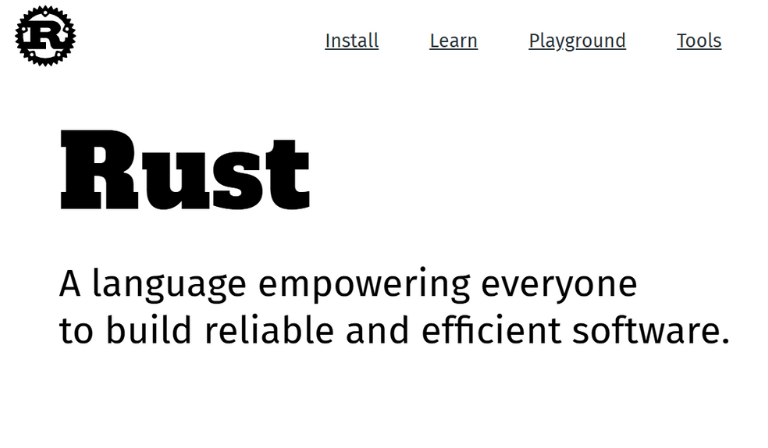
Rust is gaining popularity in blockchain development, WebAssembly, and secure backend systems, especially among startups and fintech companies seeking both speed and reliability.
Why it’s fast:
- Compiled to native code
- Zero-cost abstractions
- Fine-grained memory control without garbage collection
Use cases:
- Secure backend APIs
- Crypto and blockchain systems
- Embedded or IoT software
- High-performance CLI tools
Considerations:
- Steeper learning curve for beginners
- Smaller talent pool compared to Java or Python
- Long compile times for larger projects
C
C is one of the oldest and fastest programming languages, often considered the backbone of modern operating systems and embedded software. Its minimal runtime, direct hardware access, and deterministic performance make it ideal for low-level development.
C is still widely used in IoT firmware in Singapore, hardware-level applications, and industrial automation systems, where tight control over memory and execution speed is critical.
Why it’s fast:
- Direct compilation to machine code
- Manual memory management
- No runtime overhead
Use cases:
- Embedded systems and device firmware
- OS development
- Robotics and industrial control systems
- Legacy infrastructure
Considerations:
- Lacks safety features (no memory protection or built-in threading)
- High maintenance cost
- Not ideal for modern web or cloud-native apps
Go (Golang)
Go, also known as Golang, was developed by Google to combine the performance of low-level languages with the simplicity of modern syntax. It is the best language for backend system. This language is lightweight, compiles extremely fast, and handles concurrent operations effortlessly — making it ideal for building cloud-native applications, microservices, and high-performance backend systems.

In Singapore, the easiest programming language is a top choice among startups and fintech companies aiming for fast development cycles without compromising system performance.
Why it’s fast:
- Compiles to native code in seconds
- Lightweight runtime and garbage collector
- Excellent concurrency model with goroutines
Use cases:
- RESTful APIs and backend services
- Distributed systems and microservices
- DevOps tools and cloud platforms (e.g. Docker, Kubernetes)
- Real-time financial and logistics applications
Considerations:
- Basic type system (not as rich as Rust or Kotlin)
- Smaller ecosystem compared to Java or Python
- Limited native GUI support
Java
Java has long been the backbone of enterprise software, and it continues to evolve with modern features and performance optimizations. With Just-In-Time (JIT) compilation, a robust virtual machine (JVM), and a massive ecosystem, Java remains one of the fastest languages programming and the most reliable choices for large-scale backend systems.
Java is heavily used in banking, government, insurance, and enterprise SaaS platforms in Singapore, where long-term maintainability and stability are critical.
Why it’s fast:
- JIT compiler optimizes code at runtime
- Mature multithreading and garbage collection
- Performance tuning tools and frameworks (Spring, Quarkus)
Use cases:
- Enterprise backends and APIs
- Banking and insurance systems
- E-commerce and ERP platforms
- Android development (via Kotlin/Java)
Considerations:
- Verbose syntax compared to newer languages
- Slower startup time (cold start)
- May feel heavy for small-scale or quick MVP projects
Julia
Julia is a high-level, high-performance, and quickest programming language designed specifically for scientific computing, data analysis, and machine learning. It combines the ease of Python with the speed of C, making it a strong choice for math-intensive workloads.
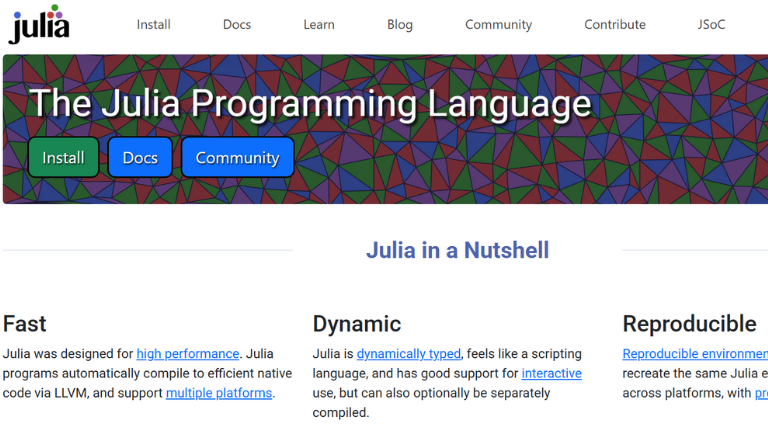
Julia is gaining attention in academic research, AI startups, and financial modeling in Singapore, where computational performance and accuracy are key.
Why it’s fast:
- Compiled to machine code via LLVM
- Optimized for linear algebra and matrix operations
- Minimal runtime overhead
Use cases:
- Scientific simulations
- Machine learning models
- Big data analytics
- Financial forecasting and risk modeling
Considerations:
- Smaller community than Python
- Limited enterprise adoption
- Fewer libraries and production-ready tools
Kotlin
Kotlin is a statically typed programming language developed by JetBrains, fully interoperable with Java and optimized for modern development. It offers a concise, expressive syntax while retaining Java’s powerful ecosystem — making it ideal for building Android apps, cloud backends, and enterprise systems.
In Singapore, Kotlin is widely adopted in mobile development, especially Android, and is increasingly used in server-side applications where speed, safety, and productivity are essential.
Why it’s fast:
- Compiles to efficient bytecode for the JVM
- Supports inline functions and smart optimizations
- Null safety and less boilerplate improve code quality and performance
Use cases:
- Android mobile applications
- Spring Boot backend development
- Enterprise SaaS platforms
- Kotlin Multiplatform (sharing code across mobile/web)
Considerations:
- Depends on the JVM (not native by default)
- Still emerging in backend adoption compared to Java or Go
- Smaller talent pool than Java in some regions
Swift
Swift is Apple’s official programming language for high-performance web apps. Designed to be safe, fast, and modern, Swift offers a clean syntax, strong type safety, and significant speed advantages over its predecessor, Objective-C.
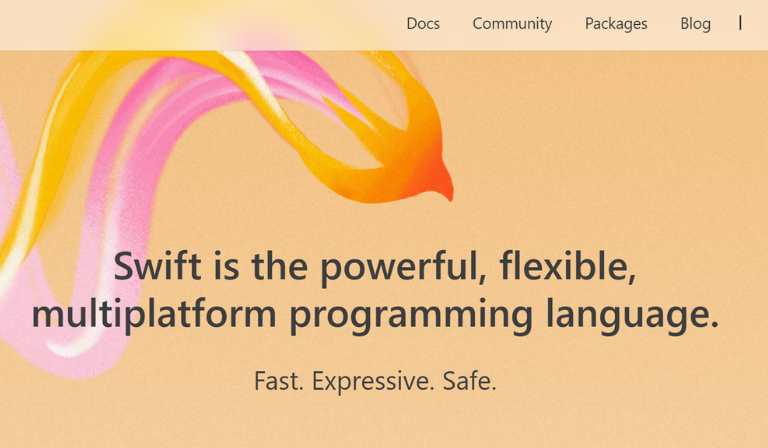
In Singapore, Swift is widely used by mobile app development teams targeting the Apple user base, which remains strong in fintech, e-commerce, and digital health sectors.
Why it’s fast:
- Compiles to native machine code for Apple chips
- Eliminates runtime overhead from legacy Objective-C
- Includes built-in memory safety and performance tuning features
Use cases:
- iOS and iPadOS mobile apps
- Apple Watch and Apple TV apps
- Fintech, e-commerce, and health apps in the App Store
- SwiftUI-based cross-device applications
Considerations:
- Primarily limited to the Apple ecosystem
- Smaller backend and cross-platform tooling compared to JavaScript or Kotlin
- Requires macOS for development and testing
Python (with Cython / PyPy)
Python is one of the most popular programming languages globally and in Singapore, known for its readable syntax, vast ecosystem, and rapid development speed. While not the fastest in raw execution, Python can be significantly accelerated using tools like Cython (which compiles Python to C) and PyPy (a faster Python interpreter with JIT compilation).
With these optimizations, Python becomes viable even for performance-sensitive applications in data science, AI, and automation — especially when time-to-market matters more than microsecond-level latency.
Why it’s fast (when optimized):
- Cython compiles critical code paths to C for speed
- PyPy uses Just-In-Time (JIT) compilation to reduce runtime
- Extensive libraries reduce development time for complex tasks
Use cases:
- AI and machine learning (TensorFlow, PyTorch)
- Data analysis and automation
- Backend services (Django, FastAPI)
- Scripting and rapid prototyping
Considerations:
- Slower than C++/Go by default
- Needs optimization for large-scale or real-time apps
- Not ideal for low-level or embedded system development
JavaScript (Node.js)
JavaScript, when run with Node.js, extends its capabilities beyond the browser to enable fast, scalable server-side applications. It’s non-blocking, event-driven, and ideal for real-time web services, especially those handling high volumes of concurrent users — such as chat apps, e-commerce platforms, and APIs.
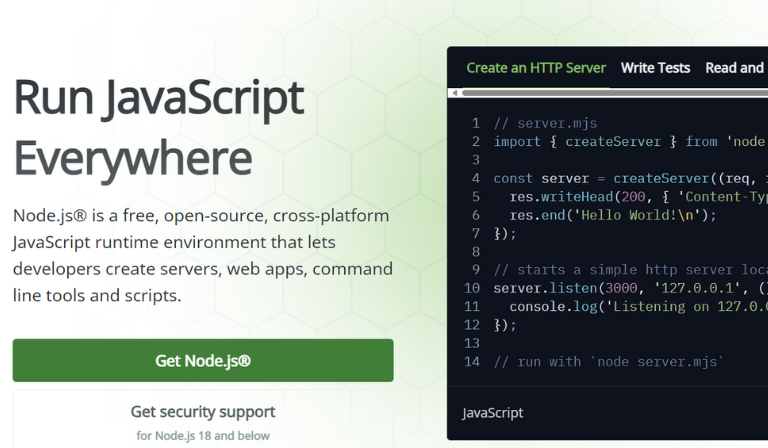
In Singapore, Node.js is widely adopted by SaaS startups, digital agencies, and fintechs building modern full-stack applications with fast release cycles.
Why it’s fast:
- Asynchronous, non-blocking I/O for high concurrency
- Lightweight runtime built on Chrome’s V8 engine
- Rapid development with a rich open-source ecosystem
Use cases:
- Real-time chat and collaboration tools
- RESTful and GraphQL APIs
- Online marketplaces and booking systems
- Server-side rendering for web apps (e.g., Next.js)
Considerations:
- Single-threaded (requires care for CPU-heavy tasks)
- Callback/async logic can become complex if poorly managed
- Performance not as strong as compiled languages for raw computation
Which Languages Are Best for Startups vs Enterprise?
Choosing the right programming language depends not just on speed, but also on the size, stage, and goals of the business. Startups typically prioritize fast development and deployment, while enterprises require long-term maintainability, scalability, and ecosystem support.
Best Languages for Startups:
- Python – Ideal for MVPs, AI, and automation
- Node.js (JavaScript) – Great for full-stack web apps and real-time services
- Go – Excellent for building fast, scalable APIs and microservices
- Kotlin – For mobile-first startups targeting Android users
Best Languages for Enterprises:
- Java – Dominates in banking, insurance, and ERP systems
- C++ – Used in finance, simulation, and embedded systems
- Go / Rust – Emerging choices for secure, high-performance backend systems
- Kotlin – Modern Java alternative for server-side and Android applications
How to Choose the Right Programming Language for Your Business
Choosing the right fastest programming languages depends on more than just speed — you need to consider how well it aligns with your business goals, technical domain, and long-term scalability.
Here are key factors to guide your decision:
- Fit with Your Industry or Domain: Some languages are better suited for certain sectors:
- Finance: Java, C++, Rust
- Retail & eCommerce: JavaScript, Python, Go
- Healthcare & AI: Python, Julia
- Embedded / IoT: C, C++
- Available Talent & Ecosystem: Choose languages with strong local or global developer support. For example, JavaScript and Python have large talent pools, while Rust or Julia may be harder to hire for.
- Scalability & Maintainability: Consider the language’s ability to handle growth. Go and Java are highly scalable; Python may need performance tuning for large systems.
- Integration with Existing Systems: Make sure the new language integrates smoothly with your current infrastructure, tools, and APIs — especially in enterprise environments.
Tip: If you’re unsure, work with a vendor like Kaopiz that can offer technical consulting from the start to guide your stack selection.
Speed Optimization Best Practices for Software Projects in Singapore
Analyzing the list of fastest programming languages is only the first step. To truly deliver high-performance, scalable software, businesses in Singapore need to apply best practices in architecture, deployment, and code design — from day one.
Here are key optimization strategies that go beyond selection for the most popular programming languages in Singapore:
- Optimize Backend Architecture: Use asynchronous logic and microservices to reduce latency and improve scalability. Lightweight frameworks minimize runtime overhead.
- Leverage Compile-Time Optimization: Choose languages with JIT or AOT compilation (like Go, Java, Rust) to boost execution performance from the start.
- Go Cloud-Native Early: Build using Docker and deploy on scalable platforms like AWS or GCP. Use serverless functions for lightweight, high-throughput tasks.
- Implement Caching & Concurrency: Add Redis or Memcached to reduce load times. Use concurrency models like goroutines (Go) or worker threads (Node.js) for multitasking.
- Write Efficient Database Logic: Optimize queries, add indexes, and use connection pooling to minimize DB bottlenecks under heavy traffic.
- Use Performance Monitoring Tools: Integrate tools like New Relic, Datadog, or AWS CloudWatch to track and resolve performance issues proactively.
- Work with a Vendor That Designs for Speed: Choosing the right language isn’t enough—partner with a vendor like Kaopiz that can design scalable, high-performance systems from day one.
How Kaopiz Helps Businesses Build Fast, Scalable, and Reliable Systems
As a trusted IT outsourcing in Singapore, Kaopiz goes beyond writing code — we design entire systems that are fast in execution, scalable in architecture, and reliable in production. Whether you’re a startup in Singapore launching an MVP or an enterprise scaling mission-critical infrastructure, Kaopiz brings both technical depth and business insight to every project.

- Match the Right Language to the Project: We help you choose the most suitable fast programming language — whether it’s Go, Rust, Python, or Java — based on your domain, goals, and team size.
- Design for Scale from the Start: Our architectures use microservices, containerization, and cloud-native principles to ensure performance and flexibility as your business grows.
- Performance-Centric Development: We apply optimization techniques like caching, concurrency, compile-time tuning, and efficient database design to keep your system fast under load.
- End-to-End Delivery Teams: Our developers, DevOps engineers, and architects work as an integrated team to ensure reliability, security, and quality from planning to release.
- Trusted by Global Clients: We’ve delivered 500+ projects across industries like fintech, logistics, healthcare, and e-commerce — serving startups and enterprises in Singapore, Japan, and beyond.
- Consulting + Execution in One Partner: We don’t just code — we advise. From choosing your tech stack to maintaining your cloud infrastructure, we’re with you at every step.
If you’re unsure where to start, consider working with a trusted partner like Kaopiz — we help businesses across industries build fast, scalable, and reliable web/apps with the right technologies from day one.
Conclusion
Selecting the right fastest programming languages isn’t just about raw speed — it’s about aligning performance, scalability, and ease of development with your business needs. In Singapore’s fast-moving tech landscape, startups often favor Go, Python, and Node.js for quick development, while enterprises rely on Java, C++, and Rust for stability and scale.
Whether you’re building a real-time platform, AI solution, or enterprise backend, selecting the right language and system architecture early on can make a huge impact on long-term success.
FAQs
- What’s the Fastest Growing Language in 2025?
- Rust, Go, and TypeScript are among the fastest growing programming languages in 2025 globally and in Singapore. They’re popular for their performance, safety, and suitability for modern web and backend development.
- Which Language Is Fastest for Backend Development?
- Go is widely regarded as the fastest programming language for backend APIs. Rust and Java are also strong choices for high-performance and enterprise-grade backend systems.
- Is Python Fast Enough for Enterprise Use?
- Yes, Python is the best programming language for enterprise apps — especially when optimized using tools like Cython or PyPy. While not the fastest by default, Python is widely used in enterprise AI, automation, and data workflows due to its vast ecosystem and rapid development speed.
- What If I Choose the Wrong Language?
- Choosing the wrong language can lead to performance bottlenecks, maintenance issues, or hiring challenges. That’s why it’s important to evaluate your domain, team, and scalability goals — or work with a tech partner like Kaopiz to guide the decision early on.
- Can I Change Tech Stack Later?
- Yes, but it often requires significant effort — including code migration, system redesign, and retraining your team. It’s best to design with flexibility in mind and consult experts before committing to a long-term tech stack.
One Reply to “Top 10 Fastest Programming Languages in Singapore [2025 Guide]”
Leave a Comment
Trending Post

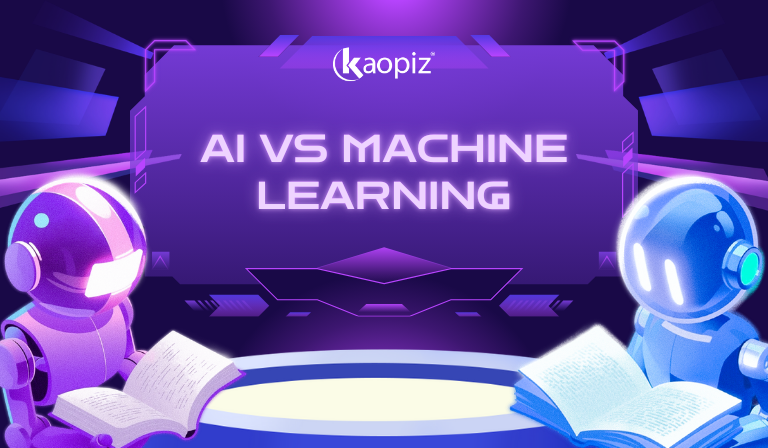
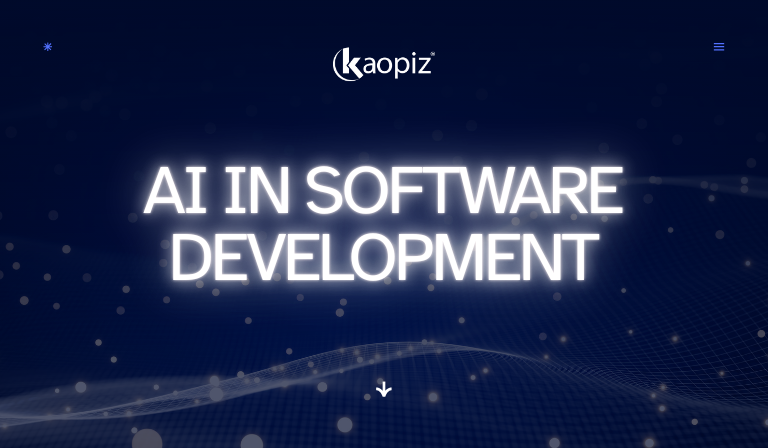
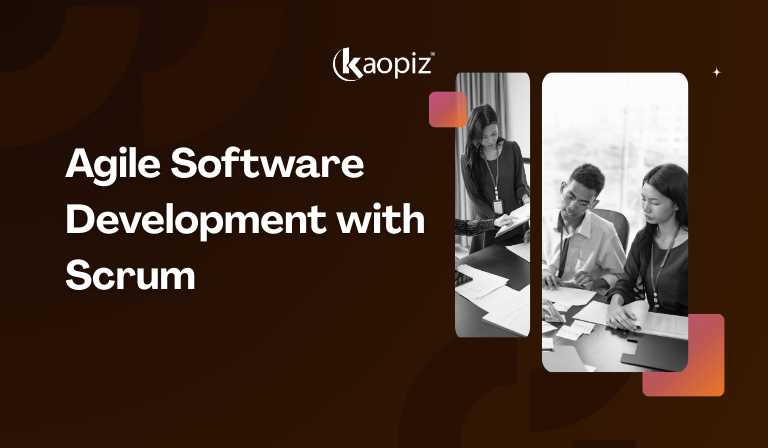

















Pingback:C# vs C++: Differences & Which Language to Choose in Singapore